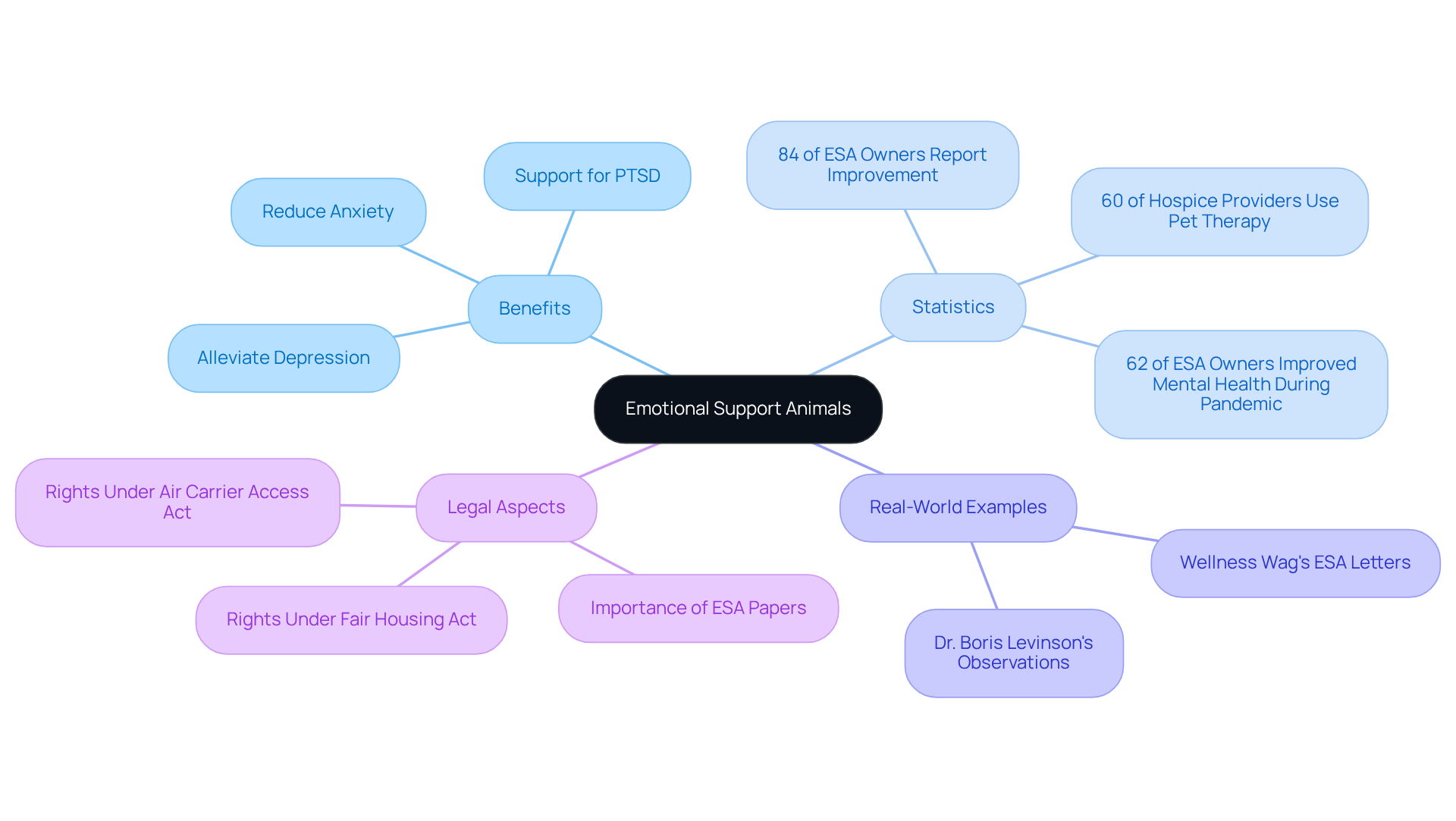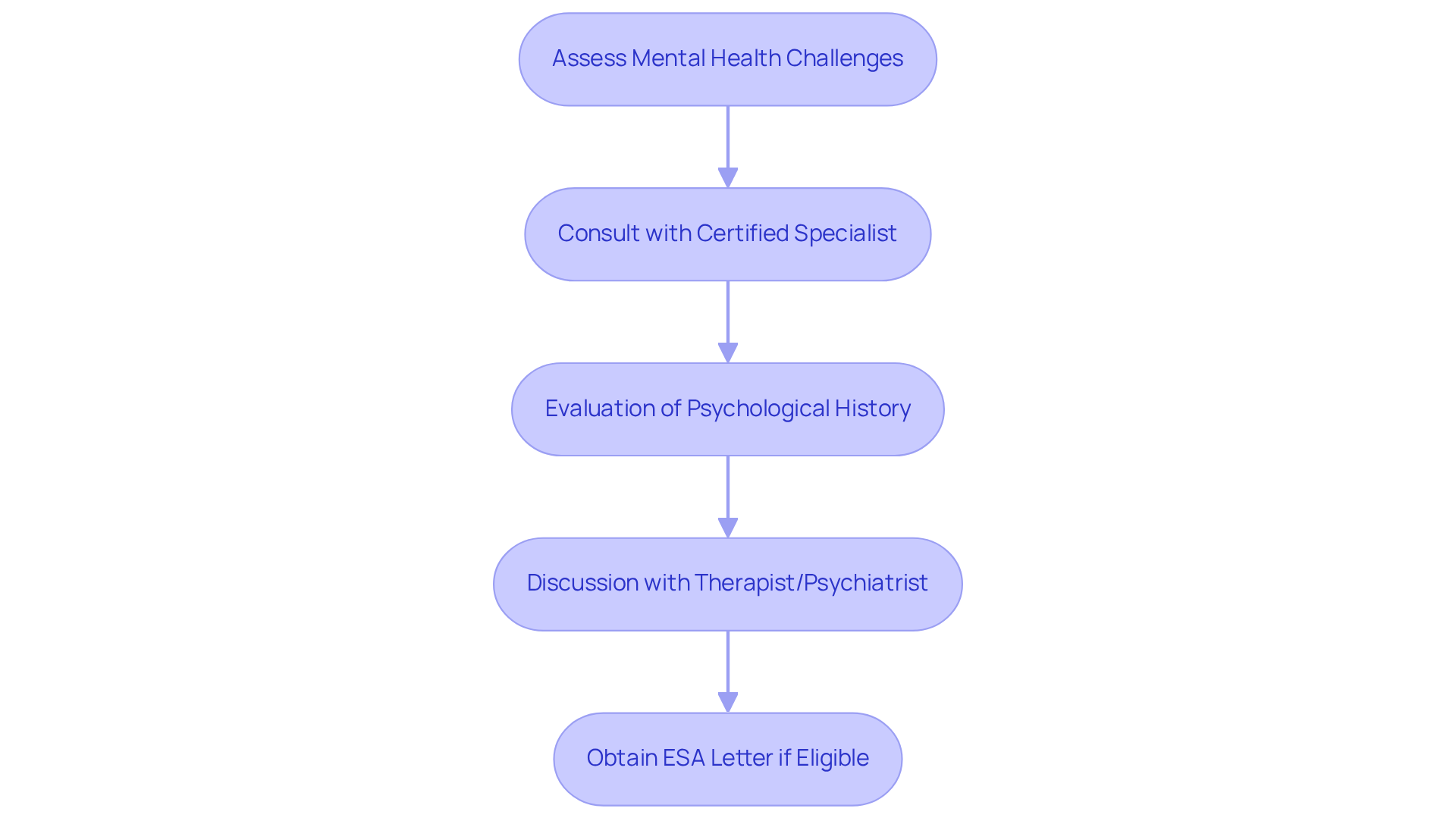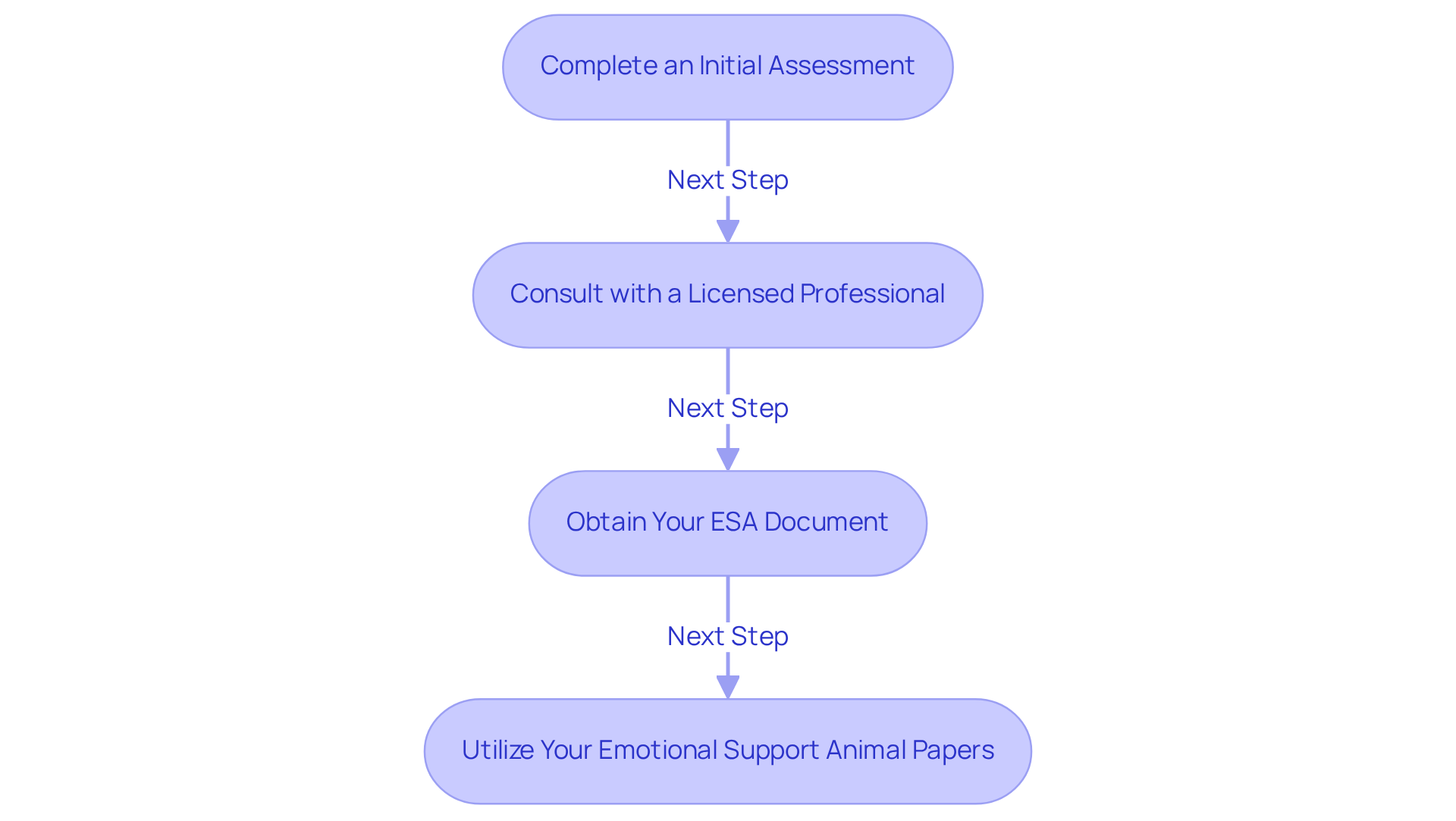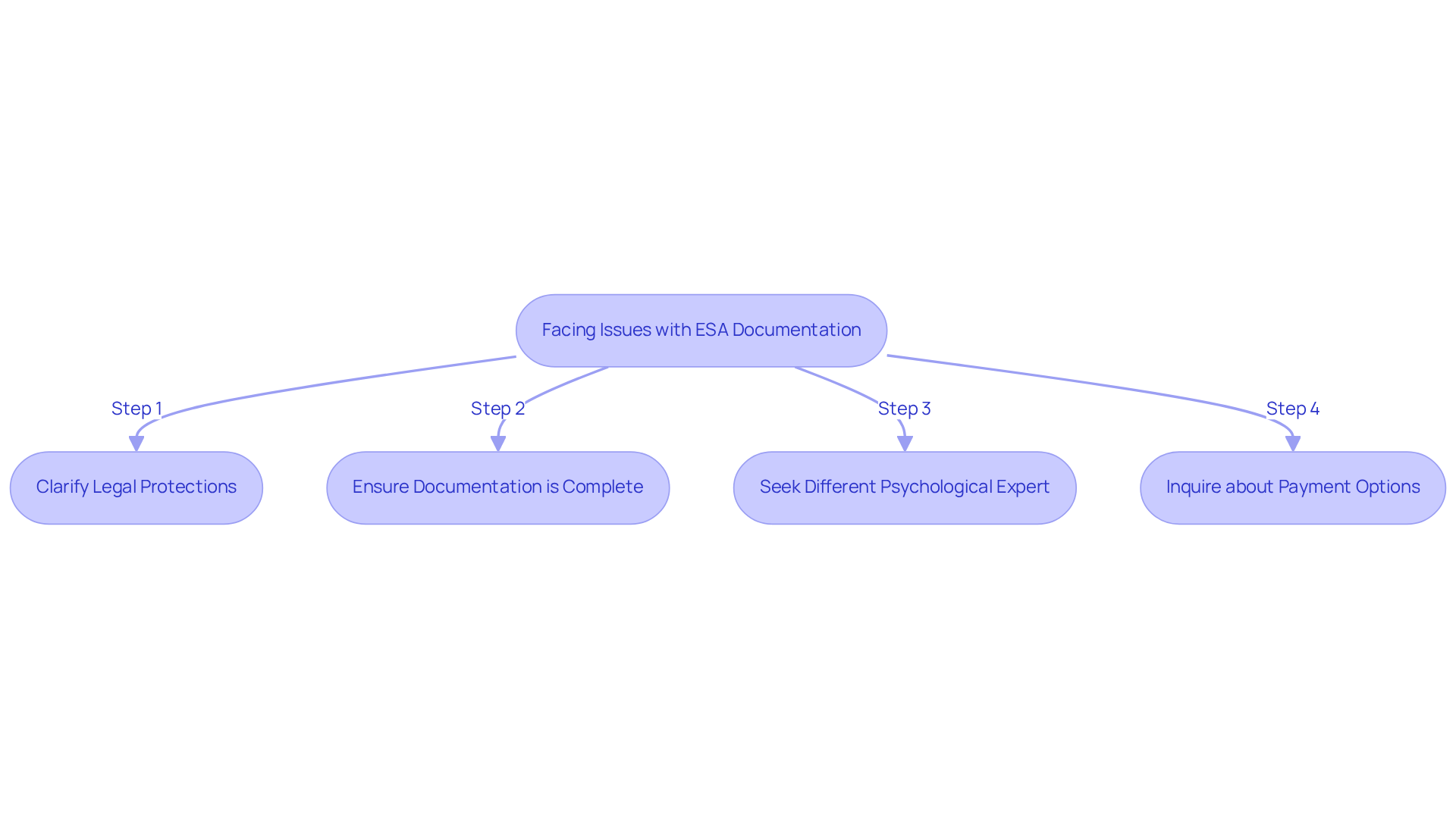

4 Steps to Secure Your Emotional Support Animal Papers
by Lena Park
Last updated: July 10, 2025
Verified and Approved by:
Angela Morris,
MSW, LCSW
Fact Checked

Overview
The article outlines a four-step process to secure emotional support animal (ESA) papers, recognizing the emotional struggles faced by individuals with mental health issues. It emphasizes the importance of consulting a licensed mental health professional to determine eligibility and obtain necessary documentation, presenting this as a supportive solution for those in need. This guidance is not just procedural; it is rooted in the understanding of the therapeutic benefits that ESAs can provide.
Furthermore, the legal protections afforded to individuals with emotional support animals under the Fair Housing Act and Air Carrier Access Act ensure their rights in housing and travel situations, offering reassurance and support in their journey.
Introduction
Emotional Support Animals (ESAs) have become vital companions for individuals navigating the complexities of mental health challenges, providing comfort and reassurance during difficult times. As awareness of their benefits continues to grow, it is increasingly important to understand the process of securing official ESA documentation. Yet, many individuals find themselves feeling perplexed by the requirements and potential obstacles involved in obtaining these crucial papers.
How can one effectively navigate this journey to ensure their emotional support animal is recognized and accommodated? This can feel overwhelming, but there is hope and support available to guide you through this process.
Understand the Role of Emotional Support Animals
Emotional Support Animals (ESAs) play a vital role in offering comfort and support to those facing emotional or psychological challenges. Unlike service animals, which are specifically trained to assist individuals with disabilities, ESAs primarily provide companionship and emotional reassurance. Engaging with ESAs has been shown to significantly reduce symptoms of anxiety, depression, and PTSD, leading to improved well-being outcomes. In fact, studies indicate that 84% of ESA owners report notable enhancements in their mental state, with many attributing their increased well-being to the presence of their beloved animals.
Real-world examples further illustrate the effectiveness of ESAs in therapeutic contexts. Mental health professionals have observed that patients with PTSD often experience reduced anxiety and improved coping skills when accompanied by their ESAs. Dr. Boris Levinson, a pioneer in animal-assisted therapy, highlighted the positive effects of animal companionship on mentally impaired young patients, emphasizing the therapeutic potential of ESAs.
Moreover, statistics reveal that nearly 60% of hospice care providers now incorporate pet therapy into their services, reflecting the growing acceptance of ESAs across various healthcare settings. This trend underscores the importance of understanding the role of emotional support animal papers, as it not only affirms the necessity for these documents but also empowers individuals to advocate for their rights under the Fair Housing Act and Air Carrier Access Act. By recognizing how their pets can serve as sources of emotional support, individuals can navigate the process of obtaining emotional support animal papers with confidence.
If you would like to learn more about our services and how to acquire your ESA document through our streamlined online process, please feel free to reach out to us at [email protected].

Determine Your Eligibility for an ESA Letter
Navigating the challenges of mental health can be incredibly difficult. Individuals often face daily struggles that significantly impact their quality of life. Conditions such as anxiety, depression, PTSD, bipolar disorder, and panic disorder affect millions across the U.S. For example, around 5% of American adults experience PTSD, which equates to over 13 million people. Globally, about 3.6% of individuals have encountered PTSD in the past year. This reality can feel isolating, but there is hope.
If you’re considering an emotional support animal (ESA), it’s important to first consult with a certified specialist who can provide the necessary emotional support animal papers based on your unique situation. This may involve several sessions to evaluate your psychological history and determine whether an ESA would be beneficial for you. If you are currently in treatment, discussing your interest in an ESA with your therapist or psychiatrist is essential. They can offer valuable insights and help you understand if you meet the criteria for an ESA letter. As certified psychological expert Lira de la Rosa advises, ‘If you’re interested in obtaining emotional support animal papers, begin by reaching out to a licensed psychological professional.’
Having a pet that provides emotional support can profoundly enhance your well-being, especially for those grappling with anxiety and depression. This process not only nurtures your mental health but also improves access to housing for students, ensuring they can fully enjoy their living experience. Remember, you are not alone in this journey, and there are compassionate resources available to support you every step of the way.

Follow the Steps to Obtain Your ESA Letter
-
Complete an Initial Assessment: Start your journey by filling out a brief assessment on a trusted platform like Wellness Wag. This evaluation is designed to help you understand your psychological needs and the potential benefits of having emotional support animal papers, which can significantly enhance your well-being.
-
Consult with a Licensed Professional: After completing the assessment, it’s important to schedule a consultation with a licensed mental health professional. In this supportive session, they will assess your unique situation and discuss the therapeutic benefits of having an ESA. If appropriate, they will provide you with emotional support animal papers, which are crucial for securing housing and travel arrangements for your emotional support animal.
-
Obtain Your ESA Document: Once you receive approval, you can expect to have your official ESA document within 24 hours. It’s essential that this document includes important details, such as the professional’s license number and contact information, to ensure it meets legal requirements. This quick turnaround is one of the many advantages of utilizing reputable online services.
-
Utilize Your Emotional Support Animal Papers: With your emotional support animal papers in hand, you are empowered to advocate for your rights in housing and travel situations. Present this document to landlords or airlines to secure accommodations for your emotional support animal, allowing you to live and travel with your pet without facing additional restrictions or fees. Remember, you are not alone in this journey, and support is available to help you thrive.

Troubleshoot Common Issues in the ESA Letter Process
Facing opposition from landlords or airlines regarding your ESA documentation can be challenging. It’s important to clarify the legal protections afforded to you under the Fair Housing Act and Air Carrier Access Act. Keeping a copy of these laws handy can be quite beneficial. As Logan Miller wisely points out, “As a landlord or property owner, you have a legal duty to understand the Fair Housing Act and its implications for assistance animals at your property.”
It is vital to ensure that your emotional support animal papers are complete. This includes all necessary information, such as the mental health professional’s license number and contact details. If you encounter any discrepancies, don’t hesitate to reach out to the expert who provided the document for clarification. Remember, as of 2023, there are approximately 115,832 registered emotional support animals in the US, highlighting the importance of having emotional support animal papers.
If a psychological expert denies your request for an ESA document, consider seeking a different perspective. It’s essential to find a professional who appreciates the therapeutic benefits of ESAs and is willing to support your needs. Many individuals have reported significant improvements in their mental health with the assistance of ESAs, highlighting the importance of this support.
Should the cost of obtaining an ESA document be a concern, inquire about flexible payment plans or financial aid options offered by Wellness Wag. They strive to provide your emotional support animal papers within 24 hours of approval, ensuring a smooth process for acquiring legitimate Emotional Support Animal letters. This approach aligns with the increasing recognition of the vital role ESAs play in mental health care.

Conclusion
Emotional Support Animals (ESAs) play a vital role in enhancing the mental well-being of individuals navigating emotional or psychological challenges. These animals offer companionship and comfort, significantly alleviating symptoms associated with anxiety, depression, and PTSD. It’s essential to recognize the importance of securing proper documentation for ESAs, as this not only affirms their therapeutic value but also empowers individuals to advocate for their rights in various settings, such as housing and travel.
The path to obtaining emotional support animal papers involves several important steps:
- Assessing eligibility through consultations with licensed mental health professionals who can evaluate individual needs.
- Acquiring the necessary ESA documentation to navigate housing and travel arrangements without facing unnecessary barriers.
- Being informed about legal protections under acts like the Fair Housing Act and the Air Carrier Access Act, as these laws safeguard the rights of ESA owners.
Understanding the profound impact that ESAs can have on mental health is key. With the number of registered emotional support animals on the rise, it becomes increasingly important for individuals to grasp the process of securing their ESA letters. Whether encountering challenges with documentation or seeking support for mental health issues, resources are available to assist in this journey. Embracing the companionship of an ESA can lead to a transformative experience, fostering resilience and a sense of belonging. Remember, you are not alone in this journey; support is here for you.
Frequently Asked Questions
What is the role of Emotional Support Animals (ESAs)?
ESAs provide comfort and support to individuals facing emotional or psychological challenges, primarily offering companionship and emotional reassurance rather than specific assistance like service animals.
How do ESAs impact mental health?
Engaging with ESAs has been shown to significantly reduce symptoms of anxiety, depression, and PTSD, leading to improved well-being outcomes. Studies indicate that 84% of ESA owners report notable enhancements in their mental state due to their animals.
What evidence supports the effectiveness of ESAs?
Mental health professionals have observed that patients with PTSD experience reduced anxiety and improved coping skills when accompanied by their ESAs. Historical figures like Dr. Boris Levinson have highlighted the positive effects of animal companionship on mentally impaired young patients.
How are ESAs utilized in healthcare settings?
Nearly 60% of hospice care providers incorporate pet therapy into their services, reflecting the growing acceptance and recognition of the therapeutic potential of ESAs in various healthcare contexts.
Why are emotional support animal papers important?
Emotional support animal papers affirm the necessity for these animals and empower individuals to advocate for their rights under the Fair Housing Act and Air Carrier Access Act.
How can individuals obtain emotional support animal papers?
Individuals can navigate the process of obtaining emotional support animal papers confidently by recognizing their pets as sources of emotional support. For more information on acquiring ESA documents, individuals can reach out to wellnesswag.com via email at [email protected].
Certify Your Emotional Support Animal Today

Why You Can Rely on Us?
At Wellness Wag, we believe your pet deserves care rooted in both science and compassion. Each article is carefully researched, written in clear language for pet owners, and then reviewed by qualified professionals to ensure the information is evidence-based, current, and practical for real-life care. Our goal is to help you feel confident in making informed decisions about your pet’s health and well-being.
Reviewed by
Angela Morris, MSW, LCSW
Angela is a licensed clinical social worker with 20 years of experience in patient advocacy and community mental health. She has assisted numerous clients with ESA evaluations and brings a deep understanding of disability accommodations, ensuring that all information is accurate, supportive, and practical.

Written by :
Lena Park
Last Updated :
July 10, 2025












